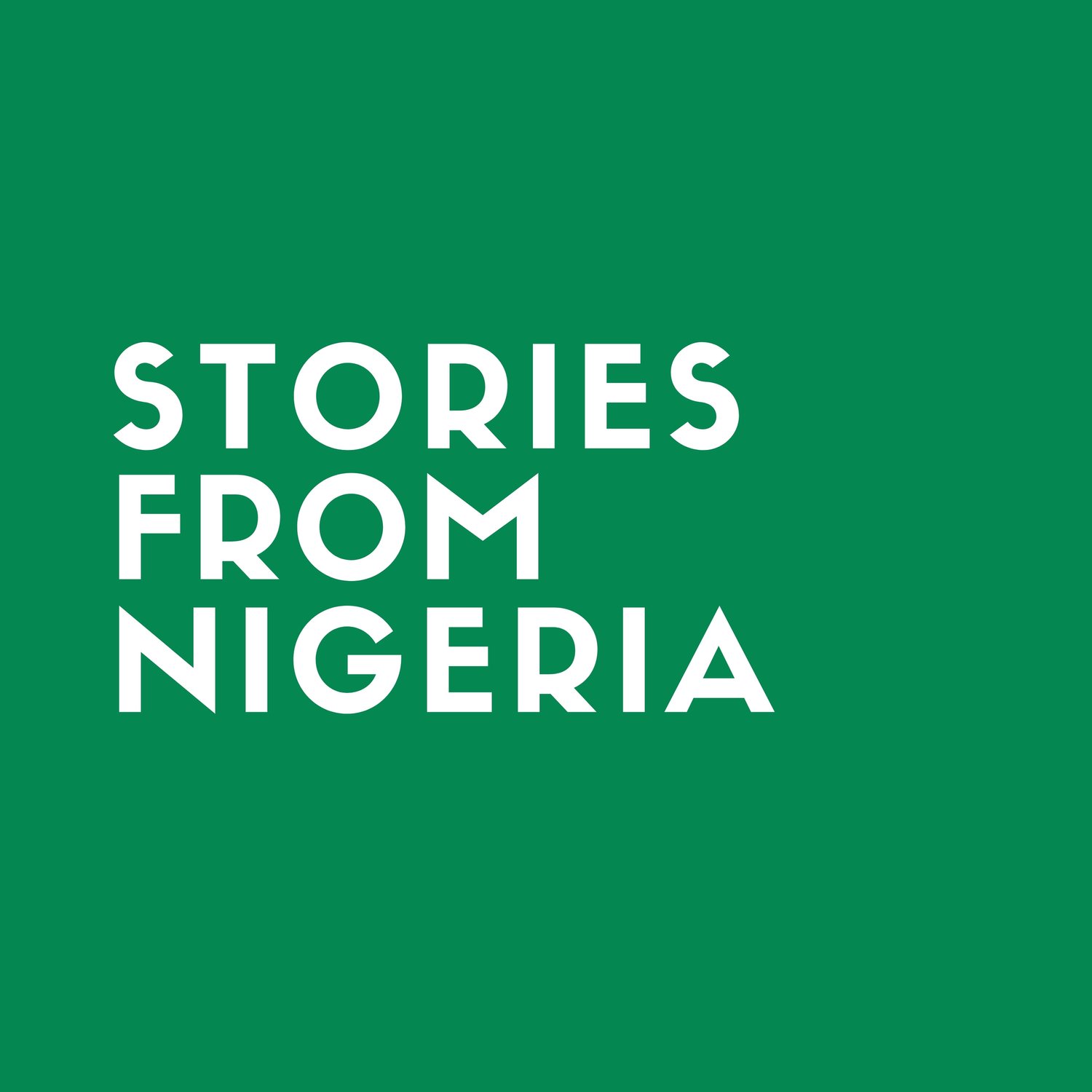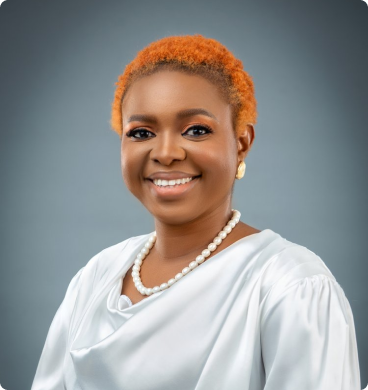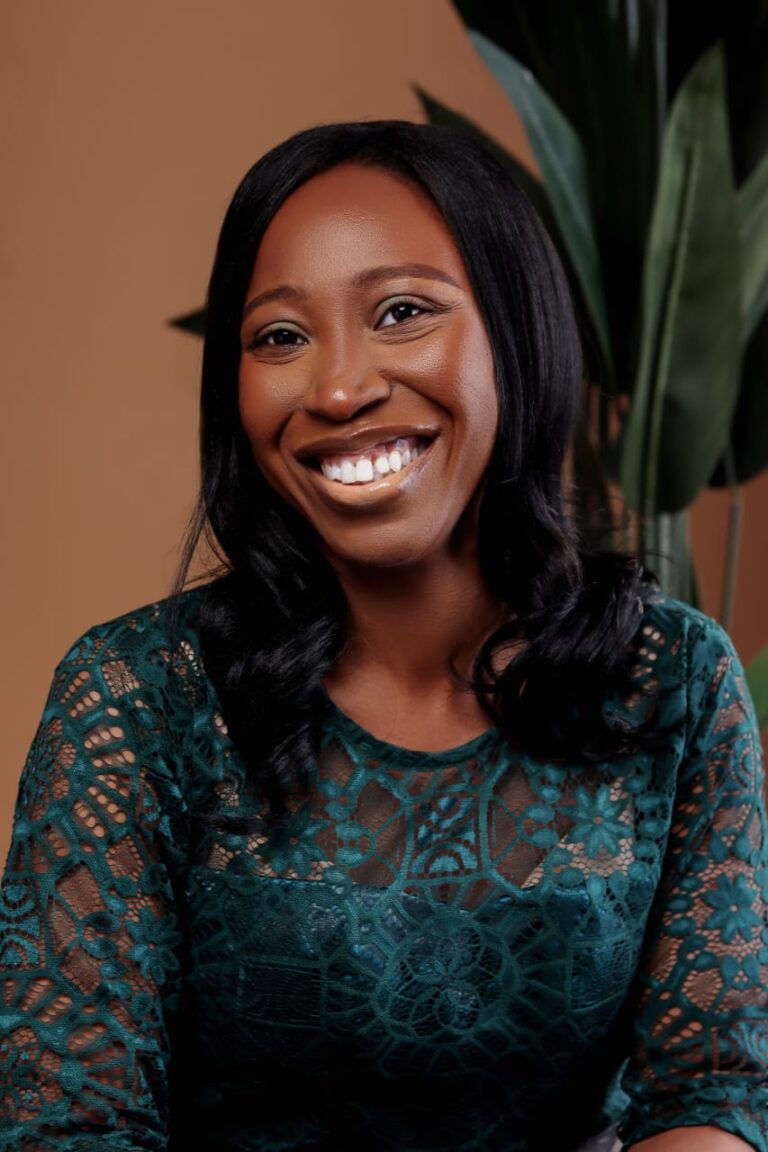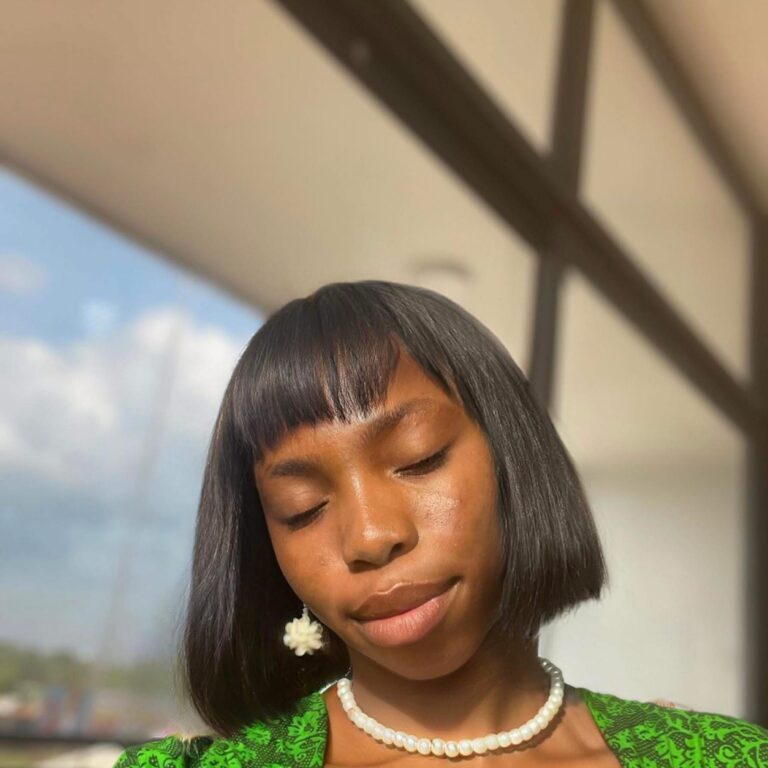My daughter Beulah was born with a congenital limb deformity.
In the first few years after we had her, I was devastated. She was to be amputated at 27 months old, and I cried every day non-stop for those 27 months.
I had too many questions; why is this happening to me? What is going on here? Who did I offend?

I always saw myself as someone who is daring. It is essential for us in life to be daring. So every day, I wake up and basically just dare. I dare to do, I dare to ask, I dare to walk the path and do the things I want to do. The most daring thing I have ever had to do is allow Beulah to get amputated. What follows that daring decision closely, is starting the Irédé Foundation; an organization that reaches out to children with disabilities across Nigeria.
This is a story largely about the power and importance of communities.
I first like to say that I am a lover of people. I love the essence of people and so beyond everything I do, I see the good in everyone. I am probably one of the very few people in the world that is actually a step away from whoever they want to meet. I’ve a bank of people; I know at least one person celebrating a birthday on every day of the year and I do celebrate them publicly. I also pride myself in being able to build and sustain relationships. I’ve friendships that I have kept for over 20 years and still maintain active communication with them. I grew up this way. Growing up, everyone brought their friends to the house; friends, and cousins all lived with us. At any time, we had a minimum of 15 people living in my house and that taught me to value community. Today, I am involved in a lot of communities; with friends, school alumni, church, and other organisations. One thing I am known for in my engagement with communities is being able to extend grace. Extending grace for me goes beyond being nice and all chummy. It is being able to give honest feedback and say what needs to be said, so, at the end of the day, positive impact and change come out of these interactions. I think I will credit this part of me to my parents, my dad especially.

My dad, even though was very quiet and introverted, he was able to accommodate having a lot of people in the house. Amidst having everyone around, you were sure he would always say what needed to be said. An example of this was when the doctors told us we needed to amputate Beulah’s leg. Everyone in the family saw it as an abomination; something we would never do in our family. My dad, however, would reach out to my husband at intervals to ask how he was doing, and how we were coping with the burden of our daughter’s disability. He will then proceed to remind him that it is critical we go ahead with the amputation so that she can have a chance to walk. Two years and three months later, we made the decision. He showed me how to be empathetic about something, but how to also very quickly tell you the decisions that need to be made. That for me is extending grace.

When I got married to Zubby, my husband, we did a lot of fun stuff together. I could just wake up and say to him “Let’s have a party”. He would look at me and ask “Party party?” And I’d respond “Not like a big party, let’s just invite people over for lunch or dinner”. Before you know it, we’d have 20 to 40 people in our house. People would sometimes stay till 11:00 pm before they had to go home. That’s the kind of person I am but in the 2 years of when Beulah was born, that part of me went numb. I was devastated and going through the motions. I asked a lot of questions, directed both to God and Zubby. There was a lot of drama between our families but my husband was quick to help me realise that this was largely about the two of us. We built a selected community around us; Zubby, me, and a few friends. One day, Zubby said to me, “God told me that He will take care of Beulah. So as much as we are grieving over this disability, I want you to know that we are in this together”. We started researching and praying. I remember hearing God say to me to eat for the journey ahead of you is very far but I knew it wasn’t about physical food. I studied and read about the disability trying to understand what causes it. Am I the only one experiencing this? I found out it has actually happened to a lot of people. I saw how people were navigating through it and I saw what I could do differently.

I cannot overemphasize how important community was during this time.
When you are a Yoruba person married to an Igbo person, you somehow are looking for a community so you are not alone.
There’s Aunty Kemi who I met while I lived in Enugu. She practically took me as her younger sister. She would cook food and bring it to us every week to ensure I didn’t have to bother about cooking. I was also working while taking care of Beulah.
I had Ifeoma who would ensure that Beulah’s clothes were sorted. She would take me out to ensure I was fine.
Uncle Yinka Adeshina was also part of this amazing community we had. They were just people we had met while in Enugu who became a key part of our community.
My mom also stayed with us for 8 months taking care of Beulah. Those 8 months gave me the time to research. It also gave Zubby and me time to bond.
Having these people around took care of the things I didn’t remember to take care of. They helped lift my spirit and helped us figure out what we needed to do with respect to our daughter.
When I decided to be a part of destigmatizing the disability, it wasn’t a difficult decision. I will explain why; my husband said yes to me. He said to me, you have my support. I had gone to him to tell him I wanted to start blogging and sharing our story. He did not say you can share your side of the story, don’t call my name. He was very supportive and said, “If that’s what you want to do, you have my support”.
My husband is great with writing, so there are times he has to do the heavy lifting of having to write or put the concepts together. Also, because the amputation did not happen until after 27 months, we had gone through the most difficult part. We didn’t have the time to be ashamed or not accepting of the situation. We were accepting of our daughter. We didn’t have to hide her. She was invited to birthday parties and we never said “Oh she doesn’t have legs or The person celebrating is her mate and has legs”. The community around us accepted her and made it very easy.

As I said, it was a daring move to start the Irédé Foundation. Beulah’s Yoruba name is Ireoluwade which means the goodness of God has come. As people of faith, we believe God was having us extend His goodness to the world. A prosthetic limb currently costs an average of 1.5 million naira (over $1,000) and you have even more expensive processes. We want every child to experience God’s goodness, their parents, and even the community to experience God’s goodness. When you give a child a limb, it’s not just that child you have given a limb. What you have done is that you are changing the future of the child, their family and their community.

I don’t do all of this for the thank yous, but what makes me emotional and cry all the time is when I see a child come to us. I interact with the child, hear the story, and notice the helplessness on the faces of the parents. After a few weeks, the same child is now walking around, and everyone involved probably does not remember the first time the child came in. Every time this happens, I say thank you to God for the opportunity to bring the smiles I see on their faces. I also cry genuinely, asking how did God count me worthy to be in this position to put this smile on these faces. Sometimes, my husband will ask me “How many children have we done now?” and we became grateful not for the numbers but for the opportunity to change lives.



If there is a word like very-much, that is how much I would advise people to join communities. I think we all need a community around us. Usually in a community, people don’t have to suffer a pain others have suffered previously; you would have somebody who has gone through the same, and can relate to it. An example is in the nonprofit space where I operate. I started feeling like I was the only person people were “japaing on” (leaving the organization to travel abroad). It meant we had to start recruiting again and when I shared with a community I was in, they said to me, you are not alone in this o. Then I asked, how have you been able to handle this? And I got someone to share and give insights into how they have managed the challenge. It is one of the best things that could shield you when issues arise. There are communities for almost everything: career, church, family, etc and even when you don’t talk and just listen, you glean a lot from the wisdom of people.
If you are a parent, you need a community of parents to understand how to deal. For instance, I am currently within a community where somebody asks when are we going to start talking about universities in this space. Our children are now getting to the stage of getting into universities, what do we need to do? Someone then says, here we have two people; one, the kids have graduated from the university, the other, the kids are all in the university. Let’s make it a topic, let’s talk about it. Questions like how did you choose university, what is going on with scholarships?
Especially if you are a parent of a child with a disability, it’s critical to know that you can’t do this alone. You need someone to hold your hand and help you understand how other people have navigated through it.

In finding a community, the first thing that comes to mind is values. All the communities I belong to, have shared values. They share the same values and the same purpose together. You need to be clear on what brings the people in the community together. In my case, I have a community of parents with disabilities. I have a community of my alumni in school and I also have a church community for married people. We have a shared purpose, there is something that connects us. If you have a community where there is a fish for instance and you are a bird, you will not fit in. So shared values and shared purpose are important. Also, don’t go into a community to collect; ask yourself what am I going to give in this community? Most times we have something to give; we have our silence to give, we have our thoughts to give, our feedback, our grace to give in that community. These are the key things for me in looking to join a community.

The Christian community, particularly the church, is important to me. We transitioned from church to church because we moved quite often; Port Harcourt, Enugu and now we live in Lagos. While we lived in Enugu where we had to do Beulah’s leg amputation, we had representatives from the church who were with us in the hospital that day. Those who were close friends and those who weren’t, our pastors, were also with us. The amputation happened on a Friday, and on the Sunday that proceeded, children from the children’s church came to be with Beulah. They had done paintings in the church and also brought her papers for her to paint. This is the power of community in the church family. Even now, at the church we attend in Lagos, nobody sees her as an outcast or treats her differently. Instead, many people just want to be her friend.
April is usually the limb loss awareness month, and I am always certain that even if nobody shows up for our event, people from my church will come. Even the branch of my church in Canada will recognize Limb Awareness Month. I have a global vision but I can’t be everywhere. However, the communities I have, whether it’s the church, my friends, or people who believe in the vision because their values align, are already getting involved in doing the work.


Currently, Irede does these comic books that we call Iredians. We were basically looking at how we could help children who have no disabilities get to know about other disabilities and be accepting of their friends with disabilities. We also try to get them to the point where they become ambassadors because children at the end of the day will become teenagers then adolescents, then adults. They are not going to be rid of a world where there is no disability, people will always have disabilities. They then get to a point where they know no discrimination or stigmatization.

The best part of my life is just living the life of the foundation. Things keep getting better even though transitioning from profit to a nonprofit organization was challenging; I had Zubby (my superman, my benefactor) come to my rescue.

My husband would say, “When Sunbo wakes up, she wakes up”. I am always awake to life, it’s how I am every day. Living life with so much bubble!




